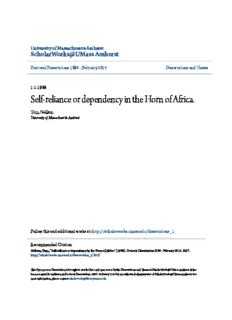
Self-reliance or dependency in the Horn of Africa. PDF
Preview Self-reliance or dependency in the Horn of Africa.
UUnniivveerrssiittyy ooff MMaassssaacchhuusseettttss AAmmhheerrsstt SScchhoollaarrWWoorrkkss@@UUMMaassss AAmmhheerrsstt Doctoral Dissertations 1896 - February 2014 1-1-1988 SSeellff--rreelliiaannccee oorr ddeeppeennddeennccyy iinn tthhee HHoorrnn ooff AAffrriiccaa.. Tom, Neilson University of Massachusetts Amherst Follow this and additional works at: https://scholarworks.umass.edu/dissertations_1 RReeccoommmmeennddeedd CCiittaattiioonn Neilson, Tom,, "Self-reliance or dependency in the Horn of Africa." (1988). Doctoral Dissertations 1896 - February 2014. 2037. https://doi.org/10.7275/cgps-dx50 https://scholarworks.umass.edu/dissertations_1/2037 This Open Access Dissertation is brought to you for free and open access by ScholarWorks@UMass Amherst. It has been accepted for inclusion in Doctoral Dissertations 1896 - February 2014 by an authorized administrator of ScholarWorks@UMass Amherst. For more information, please contact [email protected]. SELF-RELIANCE OR DEPENDENCY IN THE HORN OF AFRICA A Dissertation Presented by Tom Neilson Submitted to the Graduate School of the University of Massachusetts in partial fulfillment of the requirements for the degree of Doctor of Education May 1988 Education Copyright by Thomas R. Neilson 1988 All Rights Reserved 11 SELF-RELIANCE OR DEPENDENCY IN THE HORN OF AFRICA A Dissertation Presented by Tom Neilson Approved as to style and content by: Robert J. Mi'ltz, Cha"Ir\ Diane Flaherty, Member Hoarce B. Reed, Member — GeorgeQJrch Dean, School of Education 11 ABSTRACT SELF-RELIANCE OR DEPENDENCY IN THE HORN OF AFRICA May 1988 THOMAS R. NEILSON, B.A., SUNY CORTLAND M.Ed. NORTHEASTERN UNIVERSITY Ed.D., UNIVERSITY OF MASSACHUSETTS Directed by: Professor Robert J. Miltz This dissertation is about refugees in Somalia, how they got there, where they came from, and why they stay. It discusses the community development program, the notion of self-reliance and the manipulation of these concepts to create a circumstance of regional dependency. The research puts refugee circumstances in Somalia into a global context of economic and military oppres- sion. Dispelling the myths of poor farm management, drought, overpopulation, and backwardness, war is named as the primary cause of refugee origins worldwide. A major theme of the research is that we live in a corporate warfare/welfare world in which development aid pursues hearts and minds, as well as markets. Within this system, development workers must understand local political/social structures and put them into the context of global political/economic realities. IV Table of Contents ABSTRACT IV Chapter 1. INTRODUCTION ^ Background Purpose of Study 2. *.!!!*.! 6 Significance of the Study !*.**. e Clarifications * 7 Design of Study 9 Questionnaire and Interviews 13 Footnotes 2.4 2 . THEORETICAL ISSUES OF SELF-RELIANCE: A LITERATURE REVIEW I5 Nyerere and Uiamaa 17 Gandhi and Self-Sufficiency 22 Truth and Non-Violence 25 Truth and Civil Disobedience 26 Economic Justice 28 Education and Freedom 30 Access 31 Access and Participation 34 Education and Liberation 35 Community Development 38 Participation 41 Self-Governing Systems and the Workplace. 43 Mondragon 47 Women and Self-Reliance 49 Eritrean Women and Self-Determination. ... 50 Babu and Social Economy 53 The Political Economy of Chuch'e 54 Summary 56 Footnotes 58 3. POWER AND THE ORIGINS OF REFUGEES 65 National Security 65 A Natural Right to Power 66 Who is a Refugee 67 Power Relationships 70 Power Abuse 70 Communism and Refugees 72 Agribusiness 74 Violent Responses 80 East Timor 85 Burundi 87 V Blaming the Victim 89 Myths and Stereotypes 90 Summary Footnotes 97 4. THE FEASIBILITY OF SELF-RELIANCE AS A DEVELOPMENTAL OBJECTIVE IN SOMALI REFUGEE CAMPS 104 Food Aid 104 Food as a Weapon 108 The UN 113 The Myth of Neutrality 115 The Feasibility of Self-Reliance 118 Militarization 125 The Pervasive Security Network 126 Self-Reliance and Development 128 Summary 129 Footnotes 132 5. SELF-RELIANCE AND SELF-DETERMINATION IN THE HORN OF AFRICA 135 Strategic Interests 135 Eritrea 138 Ethiopia 143 Revolution 147 Somalia 150 The Politics of Refugees in Somalia 154 Insurgency 164 More Food 168 Summary 174 Footnotes 175 6. COMMUNITY DEVELOPMENT FOR SELF-RELIANCE... 179 Why Community Development 180 Understanding Community Development 181 Communities 185 Participation 189 Self-Help Projects 193 Income Generation 196 Refugee Health Unit (RHU) 200 Refugee Agriculture Unit (RAU) 202 Settlement 204 Social Change and the UNHCR 208 One Who Learns, Teaches 211 Summary 213 Footnotes 213 7. TRAINING FOR COMMUNITY DEVELOPMENT 216 VI Introduction 216 Background 217 Planning the Training 225 Implementation 241 Training Approach 242 Notable Incidents 246 Training Budget 248 Evaluation 249 Conclusion 250 Summary 251 Footnotes 252 8. ANALYSIS AND CONCLUSION 254 "We Have a Big Mess Here" 254 Durable Solutions 261 The Developers 263 Volags Are Nice People, But 268 The Politics of Aid 269 Self-Reliance 273 The Point 275 Footnotes 276 APPENDICES A. Collated Data from Washington Interviews.. 279 B. Community Development Questionnaire Letter 280 C. Abbreviations 283 D. Somali Map 284 BIBLIOGRAPHY 285 vii CHAPTER 1 INTRODUCTION Background This dissertation is rooted in my work with the United Nations High Commission for Refugees (UNHCR) in Somalia in 1983 and 84. It also incorporates my experiences from work and travel since leaving the United States 18 years ago during the Vietnam war. During the sixties, I was part of the anti-war movement and a supporter of civil rights, but I was slow in connecting the two. It wasn't until Martin Luther King returned from Vietnam and connected the war, racism, poverty, labor exploitation, and global domination that many of us began making these relationships. King became dangerous to the government and was assassinated. The FBI and CIA could deal with the Civil Rights Movement as long as it was "Love Thy Neighbor" and sitting at lunch counters, but demanding economic justice was another issue. I took my activism, my idealism, my anger, and my boredom to Colombia, South America with the Peace Corps, where I became an extension agent for agribusiness, soon to realize that the Peace Corps was just another instrument of US foreign policy. I left the States with the notion that I was going to teach Colombians about farming. Two decades later, I look back and say that my good intentions were racist. 1
Description: